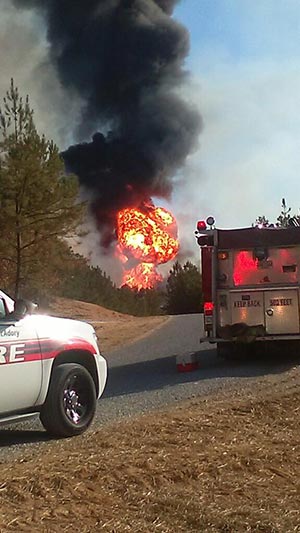Gasoline Jumps Most Since 2008 After Pipeline Blast

Gasoline in New York jumped the most in almost eight years, and its premium to crude prices soared 60% after an explosion and fire Oct. 31 in Alabama shut the largest fuel pipeline in the United States, killing one person and injuring more. Traders rushed to book cargoes from Europe.
 Alabaster Fire Department/Facebook
Alabaster Fire Department/FacebookDecember-delivery gasoline rose as much as 15% to the highest level for a front-month contract since June after Colonial Pipeline Co., which carries oil products to New York Harbor from the U.S. refining center in Houston, shut mainlines on the pipe for the second time in two months. The fuel’s premium to Brent crude, a theoretical profit margin for many refiners, jumped to as high as $18 a barrel.
The explosion, which killed one person and hospitalized five, occurred while contractors were working in an area that’s home to a “complex series of pipelines,” Major Ken Burchfield of the Shelby County Sheriff’s Office said by phone. Major fuel suppliers began notifying wholesalers in South Carolina late on Oct. 31 of allocations. A spill in September closed the Colonial Pipeline for 12 days, cutting supplies to 50 million Americans in the Southeast.
Gasoline traders responded immediately to the possible shortages, rushing to book extra tankers for replacement fuel supplies from Europe, according to two shipbrokers directly involved in the trade. Freight costs for cargoes across the Atlantic surged to the equivalent of about $17 per metric ton from about $12.40, according to data compiled by Bloomberg News.
The southeastern United States is “highly dependent on pipeline supplies from Colonial, and, ultimately, Colonial flows form the baseline of U.S. East Coast supply,” Robert Campbell, head of oil products research at Energy Aspects in New York, said in a note. The longer the mainlines are offline, “the more upward pressure will be placed on U.S. East Coast fuel prices, while downward pressure will be exerted on U.S. Gulf Coast product prices.”
The pipeline’s outage in September triggered fuel shortages across the region, causing motorists in cities such as Nashville, Tennessee, and Raleigh, North Carolina, to rush to stations to fill their tanks. The shutdown altered international trade flows for fuel deliveries and led to a federal waiver of gasoline-grade rules. The governor of Georgia issued an executive order to reiterate a state law that prevents price gouging.
For the moment, retail regular-grade gasoline prices in states including Alabama, Georgia, South Carolina and Virginia are below the U.S. average of $2.206 per gallon, according to the U.S. motorist organization AAA. The data are from 3:39 a.m. Eastern Time Nov. 1.
Wholesale gasoline for December rose as much as 21.56 cents to $1.6351 a gallon in intraday trading on the New York Mercantile Exchange. The contract traded at $1.577 at 11:25 a.m. in London. The 15% intraday gain is the largest for the active contract since Dec. 31, 2008, according to data compiled by Bloomberg.
Gasoline’s premium to Brent crude traded 24% higher at $14.05 a barrel after surging as high as $18.10 earlier. The difference between December and January gasoline futures shot up as high as 9.9 cents a gallon from 0.23 cent overnight. The gap indicates traders’ expectations for tighter short-term supplies.
Alabama Gov. Robert Bentley said in a tweet that the incident in Shelby County on Oct. 31 was about a mile west of the Sept. 9 incident. Colonial had planned between late-October and mid-November to remove a temporary bypass pipeline that was built around the site of the earlier spill.
Colonial — and to a lesser extent the smaller Plantation Pipe Line Co. — play a key role in supplying the U.S. Southeast because there aren’t any refineries between Alabama and Pennsylvania that produce substantial quantities of transportation fuels. The region is supplied primarily by pipeline flows from refineries along the U.S. Gulf Coast, according to the U.S. Energy Information Administration.
While Colonial has a capacity of 2.6 million barrels a day of refined products, the Plantation pipeline carries just 700,000 barrels a day.

